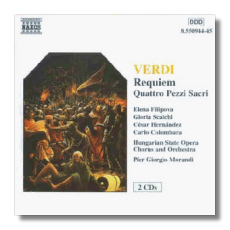
The Internet's Premier Classical Music Source
Related Links
- Verdi Reviews
- Latest Reviews
- More Reviews
-
By Composer
-
Collections
DVD & Blu-ray
Books
Concert Reviews
Articles/Interviews
Software
Audio
Search Amazon
Recommended Links
Site News
 CD Review
CD Review
Giuseppe Verdi

- Requiem
- Four Sacred Pieces
Elena Filipova, soprano
Gloria Scalchi, mezzo-soprano
César Hernández, tenor
Carlo Colombara, bass
Hungarian State Opera Choir/Anikó Katona
Hungarian State Opera Orchestra/Pier Giorgio Morandi
Naxos 8.550944-5
Once again we have performances offered by Naxos here that are not only imposing in the budget realm, but strongly challenge the better full-price entries in the market place. Hans von Bülow dubbed the Requiem, "Verdi's latest opera in ecclesiastic dress." Indeed, the air of the operatic stage is undeniably present throughout this magnificent work. And any conductor taking on this piece must be able to capture its theatrical persona, while maintaining a balance with its not quite diluted religiosity. Morandi brings off the work in grand style, effectively harnessing both sides in proper proportion.
The Dies irae is seething with drama and passion, urgency and fervor. You know it's music of grimness, of everyone's "day of wrath," but with the twist suggested above: Verdi's febrile intensity supplants the usual somber darkness found in most settings of this music with a kind of theatrical glaze that transports mourners from quiet church pews to not so dimly-lit theater seats. You see the curtain rise, but still smell the sweet, morbid flowers. Morandi and company capture the essence here. I especially like the mezzo, Gloria Scalchi and the bass, Carlo Colombara. Soprano Elena Filipova is also quite excellent, as are the chorus and orchestra. And so it goes with this performance in general, the Sanctus and Agnus Dei being especially effective. In sum, if Verdi Requiems recordings were judged by cost in relation to artistic potency, this one finishes first by a mile. Among full- or mid-price versions, in fact, it stands its ground, a ground occupied of late by Barenboim/Chicago, Abbado/Berlin, and in the past by Toscanini/NBC Symphony from 1940 and 1951, and Giulini (Angel) from the early '60's. This Naxos release, modest in provenance and performer name recognition, is a real sleeper.
In the Four Sacred Pieces, Morandi again is right on target. Here, of course, Verdi is further removed from the operatic stage and drawn closer to a more direct sacral expression. The conductor captures the purity of the music, so that the work comes across appropriately as a geriatric Verdi finding a religious sincerity, a new faith. The chorus is quite at home with the quasi-mystical nature of this work, and the orchestra, as in the Requiem, performs admirably.
Naxos provides excellent sound in both works and informative notes. If you don't own a copy of Verdi's Requiem, I can't think of a reason why you shouldn't acquire this album.
Copyright © 1998, Robert Cummings


















